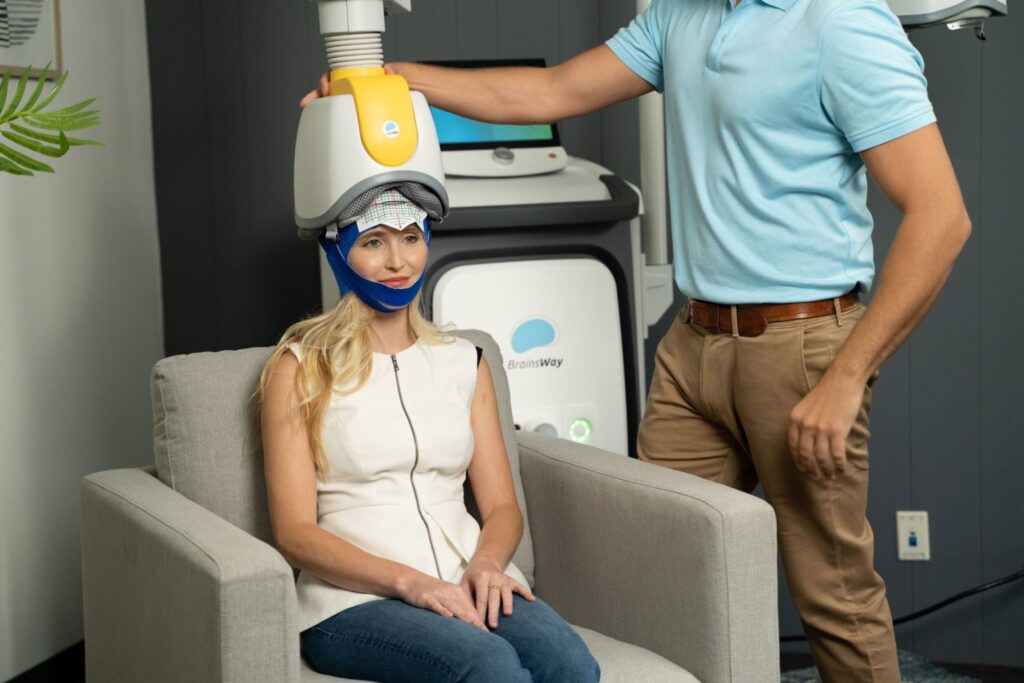During a Transcranial Magnetic Stimulation (TMS) session, patients can expect a comfortable and non-invasive experience. At Resiliency Mind+Body Medicine, we use the Brainsway machine, a system that utilizes Deep Transcranial Magnetic Stimulation (Deep TMS™). Deep TMS treatment has been proven to offer significant results by directly stimulating deeper and broader areas of the brain, effectively treating conditions such as depression, anxious depression, obsessive-compulsive disorder, and smoking addiction.
What to Expect: Initial Visit
Initial Mapping: Mapping refers to the initial session where your psychiatrist will measure and record accurate placement of the TMS coil based on the specific anatomy of your head. A tight-fitting cap will be placed on your head which will assist in mapping the correct area of TMS treatment. This session is non-invasive and you will be comfortable the entire time in our treatment chair. This session takes approximately 15 minutes.
What To Expect: Follow Up Session
Each patient typically undergoes 34-36 total TMS treatments that are done daily Monday through Friday for five to six weeks. Each session will take approximately 15-20 minutes, with total clinic visit time expected to be 30 minutes each of these visits.
Preparation: Patients will be comfortably seated in a chair, and the TMS technician will ensure proper positioning and comfort. The patient’s specific head measurements that were recorded during mapping will be used each visit for optimal placement of the magnetic coil.
Coil Placement: The TMS technician will place a specially designed electromagnetic coil on the patient’s scalp that is contained in a helmet. The coil is positioned over the targeted brain region, typically the left prefrontal cortex. The coil is on a moving stand and will rest comfortably against the scalp.
Magnetic Stimulation: Once the coil is in place, the TMS device will be activated, delivering rapid and painless magnetic pulses. Patients may hear clicking sounds and feel a tapping or tingling sensation on the scalp during the stimulation.
Treatment Duration: A typical TMS session lasts approximately 15 minutes, depending on the specific treatment protocol prescribed by the psychiatrist.
Post-Session Activities: After each session, patients can resume their normal activities immediately, as there is no recovery time needed. TMS does not impair cognitive functioning, so individuals can drive or return to work or daily tasks without restrictions.
Insurance Coverage:
Insurance coverage for TMS treatment varies depending on the specific insurance plan and the diagnosed condition. Major depressive disorder (MDD) is the most commonly covered diagnosis for TMS. Many insurance providers recognize the effectiveness of TMS for MDD and may provide coverage for a predetermined number of treatment sessions. However, it is essential for patients to contact their insurance provider to determine the extent of coverage, any pre-authorization requirements, and potential out-of-pocket costs. Our team at Resiliency Mind+Body Medicine will assist in the pre-authorization and verification of benefits process.
While insurance coverage for other mental health conditions, such as anxiety disorders or obsessive-compulsive disorder (OCD), may also be available, it is advisable to check with the insurance provider for specific details. Some plans may require documentation of treatment resistance or intolerance to traditional therapies before approving coverage for TMS.
Additionally, it is important to consult with your team at Resiliency Mind+Body Medicine to navigate insurance coverage. We can assist in verifying benefits and obtaining prior authorizations if needed. We also offer alternative payment options or financial assistance programs for those without insurance coverage.
In conclusion, a TMS session is a comfortable and non-invasive procedure that involves the placement of an electromagnetic coil on the scalp to deliver magnetic pulses to specific brain regions. Insurance coverage for TMS varies, with major depressive disorder being the most commonly covered diagnosis. Patients should contact their insurance provider and consult with their team at Resiliency Mind+Body Medicine to understand coverage details and explore alternative payment options if necessary.
For Further Reading, Check out Our Blog Post on TMS:
https://www.resiliencymbmedicine.com/post/harnessing-the-healing-power-of-transcranial-magnetic-stimulation-tms-a-revolutionary-treatment
